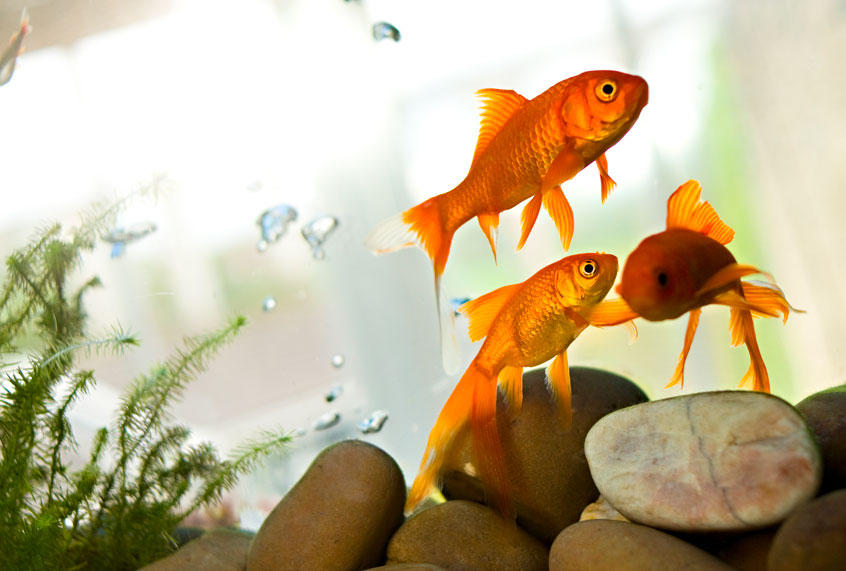Is it silly to mourn the death of a beloved pet goldfish — or to wonder what it was thinking while it was alive?
My fiancee, who bought Fred the Fish roughly a year before we met, definitely does not feel this way. A few days after he passed away, she told me about a dream that she had involving Fred. In the dream, instead of being dead, Fred had simply been sent to an aquarium with lots of other fish. Although there were visiting hours, my fiancee was warned that the fish might not remember their former owners if they stopped by to say hello. Yet when my fiancee came by to see Fred and brought her grandmother (who in real life has been deceased since 2004), her old pal emerged from the thousands of goldfish, swam right over to her and exclaimed “Hi!” in a voice that sounded like the titular protagonist from “Finding Nemo.” She was happy to see him, but noticed that he had red spots on his head and gills (much like the disease that killed him in real life). When Fred noticed that she was concerned, he asked in an innocent, questioning voice, “Am I sick?”
This dream hit me right in my feels, and not simply because I’ve been mourning Fred. It made me wonder: How much do fish really know about their own lives? Scientists have proved that fish have memories which last for months, and it is known that they are complex social creatures with thoughts and feelings.
Yet at the same time, until we noticed the red spots on Fred’s nose and gills (by which time it was too late to help him), my fiancee and I had no idea that he was sick. If he had made any effort to let us know that he wasn’t well, we didn’t pick up on it.
The question applies more broadly to pets in general. I recall my childhood dog, a Schipperke, whom our veterinarian described as a “stoic” after learning that his body was riddled with cancer but he never let out so much as a whimper to any of us. I also think, less morbidly, of the cats who stare or meow at owners who struggle to understand their needs; or the dogs that seem to be engrossed while watching television, though in theory they don’t understand what’s on the screen; or the various encounters pet owners have had with their rabbits and gerbils, their pigs and birds.
Is it possible to get into the mind of an animal?
“A lot of visual thinkers are really, really good with animals,” Temple Grandin, a professor of animal science at Colorado State University and consultant on animal behavior, told Salon. Grandin, who is on the autism spectrum (as is the author of this article), has also found that her uniquely visual way of thinking has helped her communicate with animals. “And visual thinking helped me in my work with animals because it was obvious to me, I could look at what cattle were seeing when they refused to go through a facility. And it was obvious to me, but not obvious to other people that are more word thinkers.”
She later added that “the thing I always tell students” is that “an animal is a sensory-based thinker. Get away from words. What is it seeing? What is it hearing? What is it feeling? It’s a sensory-based world.”
In addition to Grandin’s observation about animals being visual thinkers — something that she has used to help the agricultural industry behave more humanely toward, say, cattle who are terrified of being led to where they need to go — I also thought of an interview I had in July with Steve Jenkins and Derek Walter, animal rights activists best known for the sanctuary farm they created and named after their beloved pet, Esther the Wonder Pig. In our conversation, they observed that it’s important to remember that animals are individuals, not just “livestock.”
“The word ‘livestock’ has a whole bunch of clouds around it,” Walter told Salon. “We’re thinking about individuals and we’re calling them ‘stock,’ like a can of corn on a shelf. The commodity of farm animals has created sort of this barrier where we’re disconnected from what we consider our companion animals — the animals that we love, the animals that we sit down with at home and invite into our home — and the animals we consume, and consider them to be food animals. So there’s this huge line down the middle that exists, and when we get to meet the animals here, the residents, we realize that they’re all individuals. They have names, they have likes and dislikes, they have a chart like you’d see at a hospital. They have routines.”
In the end, I doubt there is any one-size-fits-all answer for trying to better understand our beloved pets. When my fiancee and I finally decide to buy another animal companion — whether a goldfish like Fred or any other species — I will remember what Grandin told me about trying to think in a sensory way like the animal itself, and hope that doing so may help me better pick up on early signs that it may not be well. I will also try to remember Walter told me about how each animal is an individual, and instead of assuming that there is a single “right” way to take care of it, I should try to figure out its needs based on its behavior.
Most of all, though, I will not humor the idea that any animal’s life is too small, too unimportant, to be worth mourning. Fred was a good fish, and he will be missed.


